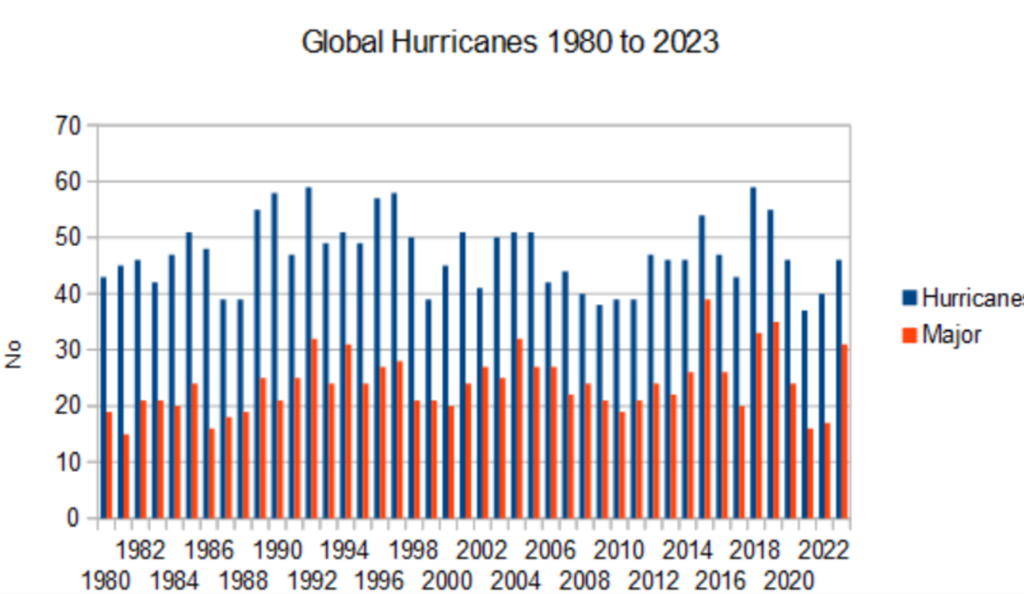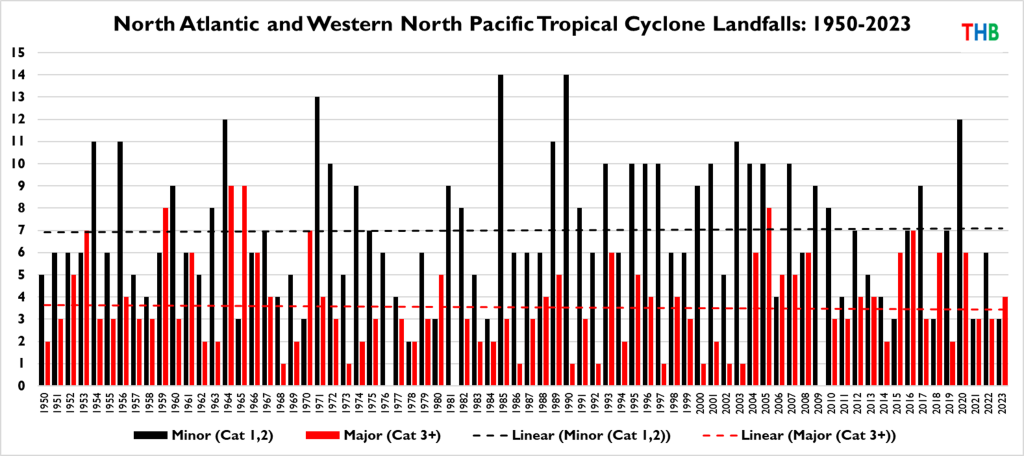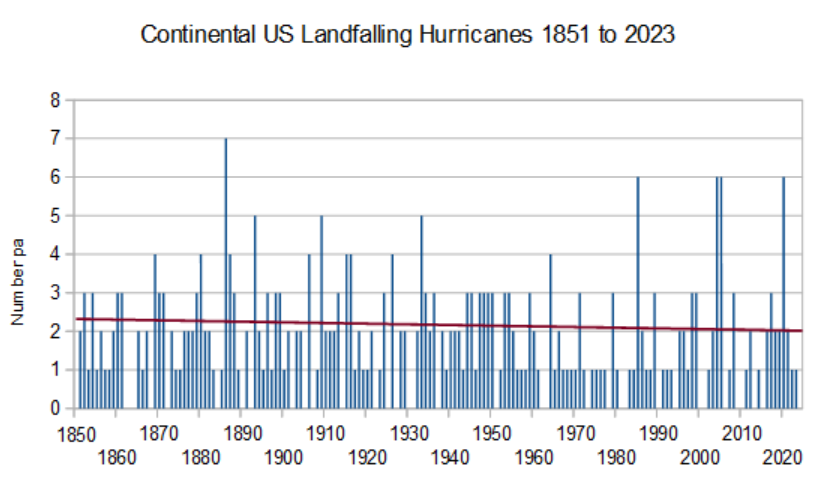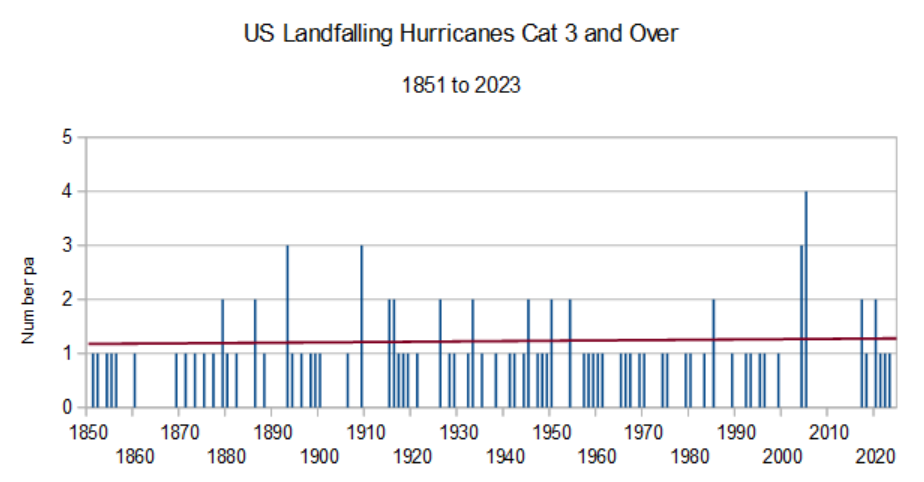EVERY time there is a bad hurricane, the BBC claims implicitly or explicitly that they are getting worse – more frequent, stronger or both. Last August, when Hurricane Idalia hit Florida, they wheeled out an old video from 2022 of weather girl Louise Lear claiming that ‘there was evidence that hurricanes are getting more powerful’. The video was laughingly billed as a BBC Reality Check!
Such evidence simply does not exist, and the claim flies in the face of what hurricane scientists have known for years.
We now have the full data for last year, and it confirms that there is still no evidence for her claim.
Globally there were 46 hurricanes in 2023, just below the average of 47 since 1980 when effective satellite coverage began. The number of major hurricanes, Category 3 and over, was above average, but was well below normal in the previous two years.

https://tropical.atmos.colostate.edu/Realtime/index.php?arch&loc=global
We have longer reliable records for landfalling storms prior to the satellite era. Many mid-ocean storms were of course missed in those days. Records since 1950 for the Atlantic and NW Pacific, the basins which account for about two-thirds of all the world’s hurricanes, confirm that there is no upward trend in either all hurricanes or major ones. If anything, the trend is down.
[Note – hurricanes can also be referred to as tropical cyclones, cyclones or typhoons, but they are all the same.]

https://rogerpielkejr.substack.com/p/global-tropical-cyclones
The longest dataset of the lot is for US landfalling hurricanes, for which we have good records as far back as 1851. Again, trends are flat.


https://www.aoml.noaa.gov/hrd/hurdat/All_U.S._Hurricanes.html
The National Oceanic and Atmospheric Administration (NOAA), the US Federal Agency for all things climate, could not make it any clearer. This is what their latest assessment, updated as recently as last week, says:
‘There is no strong evidence of century-scale increasing trends in US landfalling hurricanes or major hurricanes. Similarly for Atlantic basin-wide hurricane frequency (after adjusting for changing observing capabilities over time), there is not strong evidence for an increase since the late 1800s in hurricanes, major hurricanes, or the proportion of hurricanes that reach major hurricane intensity.’
https://www.gfdl.noaa.gov/global-warming-and-hurricanes/
But the BBC are not interested in facts and data, and will continue to peddle their lies.
Hydrogen splurge does not add up
NOT content with spending £40billion of our money to subsidise Drax’s wood burning plant, as I reported last week, the government have now awarded £2billion to hydrogen producers in the first hydrogen auction round.
All the approved projects will use electrolysers. These schemes are rated at just 125MW, so the amount of hydrogen produced will be minuscule, about 0.1 per cent of the UK’s natural gas usage.
The cost will be spread over the lifetime of these projects, expected to be around ten years, but already the government has launched the second allocation round, expected to be seven times as big. This will push annual subsidies well over the billion mark.
The subsidies will operate via the Contracts for Difference scheme, which is already used to pay out billions to wind farms; the cost is expected to be passed on to our gas bills. The index-linked guaranteed strike price starts at £241/MWh. To put that into perspective, the wholesale price of natural gas is currently around £30/MWh. On top of the cost of producing the hydrogen can be added the billions more needed to store it for use in winter and upgrade the distribution network.
The objective is to have 10GW of hydrogen capacity by 2030. At these prices, the annual subsidy could reach £16billion. There may be some savings from economies of scale, but electrolysers are an established technology with little room for improvement. The real problem lies in the fact that they need lots of electricity, which is four times the price of gas, and will get much more expensive still as cheap fossil fuels are phased out in favour of heavily subsidised renewables.
In other words, you take expensive electricity, spend more money turning it into hydrogen, then more storing it. And then burn it instead of much cheaper gas! All in the quest for Net Zero.
The government is on the horns of a dilemma, so far as domestic heating is concerned. It wants to force us to convert to heat pumps, which few can afford. The alternative of installing hydrogen-burning boilers is no better though, because it would likely put up our energy bills by £3,000 a year.
If all this was not bad enough, where will the extra electricity come from? Once gas power stations are shut down as planned, we will not have enough electricity to meet current demand, never mind heat our homes and power our cars.

